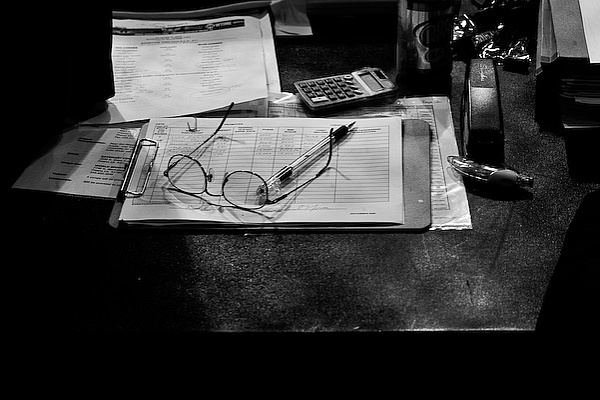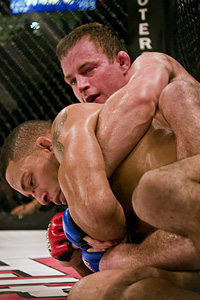Sherdog.com’s 2009 Year-End Awards: The Complete List
Robbery of the Year
Sherdog.com Staff Jan 19, 2010

S.
Albanese/Tailstar.com
Sherdog’s Robbery of the Year: Easton W5 Beebe
By Luke Thomas (alldaymma@gmail.com)
Advertisement
Mixed martial arts pundits, fans and even UFC President Dana White himself often complain of the ineptitude pervasive in the various roles played in athletic commission officiating. White’s favorite target is veteran referee Steve Mazzagatti, but no dedicated observer of MMA will tell you the problems are isolated or the solutions simple to implement.
Every so often, however, an incident of amateurishness takes your
breath away. Sherdog’s Robbery of the Year for 2009 is so painfully
obvious that even other egregious examples of poor scoring this
past year pale by comparison. Were we to somehow combine the
horrendousness of Michihiro
Omigawa’s “wins” over Marlon
Sandro and Hatsu Hioki,
we still could not touch what happened at an Ultimate Warrior
Challenge event in Fairfax, Va., on Oct. 3.
The scene was UWC 7 at the Patriot Center on the campus of George Mason University. Local bantamweight standout and Lloyd Irvin jiu-jitsu black belt Mike Easton was set to defend his 135-pound UWC strap against former World Extreme Cagefighting bantamweight champion Chase Beebe in that card’s main event. At the time of the event, this was the most significant and high-profile professional MMA contest ever in the Washington, D.C. area.
But first, there’s a back-story. Easton and Beebe were set to clash eight months earlier, but Beebe -- at the time part of Matt Hughes’ H.I.T. Squad -- never showed up to the airport, weigh-ins or the fight. Teammate Justin Robbins eventually filled in, only to get guillotined by Easton in the third round of their title fight at UWC 5.
By the time UWC 7 rolled around, local fan antipathy toward Beebe had crystallized heavy support for Easton. MMA fans across the area were dying to see Easton crush an opponent that would launch him into international relevance, especially one whom they believed had previously flaked on him to be a part of the first Dream featherweight grand prix; Beebe insists there was miscommunication.
The D.C. media got in on the hype, too. Easton had been making the rounds in print, radio and television outlets across town for what seemed like weeks -- a gigantic step for an athlete in a sport yet to be fully embraced by the local sports media.
The UWC 7 card not only featured Easton vs. Beebe but also arguably the most important North American flyweight fight in MMA history between Pat Runez and John Dodson. In other words, this was a serious event with a lot riding on the line.
But heading into the event, something was not right. Virginia’s athletic commission had set an ominous tone before the fights even started. Among a variety of other troubling infractions, the weigh-ins for the event were held with a scale that sat on a carpet, a completely inaccurate measurement of weight in a moment where precision is non-negotiable. Brazilian Felipe Arantes was even allowed to fight fellow countryman Freddy Assuncao with Shinya Aoki-esque shootboxing pants on despite such attire being completely banned by the Unified Rules of MMA.
Despite these worrisome oversights, the UWC had no choice but to continue on. Fast forward to the main event. Easton entered the arena to local Washington, D.C., go-go music and raucous applause; Beebe to jeers and boos.
The fight began.
The first round was fairly uneventful early, with Easton showing off incredible head movement and crisp boxing while Beebe seemingly bided his time. Halfway into the round, however, Beebe got Easton down and took his back with both hooks in. He tried to pepper Easton with busy shots and rear-naked chokes but to no avail. Beebe spent half of the round on Easton’s back and, prior to that, had taken very little damage.
Round two was a different story. Easton deftly used his far superior striking, takedown defense and cage generalship to easily take the round. Now, the fighters were tied one round apiece.
Round three, though, was the clear moment of departure for Beebe. What appeared to be Easton’s momentum in the second round turned into frustration and what Sports Illustrated’s Josh Gross called “suffocating” control. In rounds three, four and five, Beebe was able to take Easton’s back, maintain control and hold it for a minimum of three minutes; in the fifth, it was more than four minutes. While Easton was clearly the superior striker and did land strikes for the portions of the fight that occurred on the feet, it was clear they were not particularly damaging. Easton had discussed pre-fight how his goal was to slow down the fight -- a strategy that seemed to play against him, as his pace never had the urgency that was necessary given how much riding time Beebe had accrued on Easton’s back.
In fact, at no point in the fight was Beebe ever rocked, knocked down or stunned. He did not offer a great deal of resistance striking, but he did not really have to, either. By spending so much time on Easton’s back, the complexion of the fight was obvious to anyone with even moderate knowledge of MMA scoring. And while Beebe was never able to submit Easton nor offer stiff ground-and-pound, he consistently placed Easton in a deeply compromising position and maintained the position for huge portions of four of the five rounds. It was a grappling control clinic that made scoring the fight a matter of basic arithmetic. Cageside, I scored it 49-46 Beebe, four rounds to one.
The fight ended, and before the decision was even announced, members of the crowd began to leave the venue. Others awaited an official decision, but as I walked to the cage, I could tell by the looks on the faces of those in attendance that there was no mystery about what was coming.
The scores were announced and right away something was amiss. It was announced to be a split decision. How could that be? Now the crowd was paying attention. One judge scored it 48-47 Beebe, a defensible score. The other two, on the other hand, turned in a score that caused the hometown crowd to hurl deafening boos: 49-46, Easton. Four rounds to one for the champion.
MMA journalists in attendance were gobsmacked.
MMA writer Kelly Crigger, who was cageside at the event, believes Beebe’s refusal to fight Easton at UWC 5 played a role in the judges’ minds: “I’d like to think that the judges scoring the bout were uninfluenced by Beebe’s past indiscretions, but how else can the outcome be explained? I clearly remember my jaw hitting the floor when the decision was announced because I haven’t seen a robbery of that magnitude since Ricco Rodriguez lost to [Antonio Rodrigo Nogueira] in Pride years ago.”
“In my mind, it was a robbery because Beebe spent most of the fight on Easton's back,” said USA Today’s Sergio Non, also in attendance that evening. “Beebe thoroughly controlled the action on the mat for the bulk of the fight; Easton defended well and landed flurries near the end of each round, but he didn't cause that much damage -- the most significant injury Beebe suffered was self-inflicted, with swelling on left hand from a punch he threw early in the fight.”
AOL Fanhouse’s Michael David Smith, not in attendance, chalks up the result to the familiar problem of boxing judges evaluating a contest they do not understand.
“I think the cause of this and some other terrible decisions in MMA is that judges who don’t really understand MMA are brought in from boxing,” Smith said. “In the Olympics, they don’t bring in a diving judge and tell him to judge gymnastics just because both sports involve acrobatics. But in MMA a lot of boxing judges come in and don’t really take the time to learn the sport.”
As MMA grows and becomes legalized in new territories, athletic commissions can often be ill-equipped to handle professional MMA fights of significance. Their inability to properly do their job only causes harm to the fighters they mistreat, a perverse reversal of their actual responsibilities of safeguarding and protecting the combatants, as well as the sport.
According to Gross, the essence of this robbery and what truly sets it apart is the human cost paid by Beebe. “You can blame the judges, but it only affects one person -- the fighter who loses,” Gross said. “The loss impacted his bottom line and didn’t put a halt to the negative momentum.”
Beebe, a former champion, came into the Easton fight having lost three in a row. Three weeks later, Beebe lost to Yoshiro Maeda in Dream, making it five straight losses. He later appeared despondent at that event’s post-fight press conference, barely able to contain tears and seemingly unsure of what he was going to do with his life. As of now, Beebe continues to train and plans to fight again, although there are no formal plans.
The MMA community rarely takes inventory of the damage robberies have on a fighter’s career. Getting more competent athletic commission officials or producing better scoring criteria are important, no one would disagree. The very livelihood and self-identification of fighters hang in the balance. But getting it right is less about making sure we do not blemish a fighter’s polished record; it’s about making sure we do not damage careers and even lives. Fighters in this grueling sport of human combustion deserve nothing less.
Disclosure: Luke Thomas is the color commentator for the UWC. He is also the Editor-in-Chief of BloodyElbow.com and the host of MMA Nation on 106.7 The Fan FM in Washington, D.C.
More




 Yearly Awards
Yearly Awards




